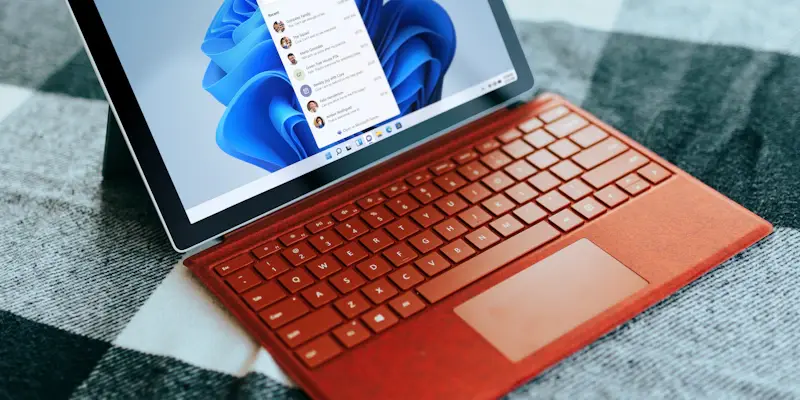During the Consumer Electronics Show (CES) 2025, it became clear that Microsoft is placing a significant emphasis on enhancing Windows 11 with advanced AI features, rather than proceeding with a new version, Windows 12. This strategic move by the tech giant aims to redefine user interaction with PCs through AI-powered functionalities and promises considerable performance improvements. One noteworthy advancement introduced is the development of Copilot+ PCs, coupled with the integration of AI tools like Copilot and ChatGPT directly into Windows 11. The company asserts that Copilot+ PCs could deliver performance that is 50% faster than an M3 MacBook, positioning this technology as a game-changer in personal computing.
The decision to focus on Windows 11 and its AI advancements is also influenced by the impending end of support for Windows 10, scheduled for October 14, 2025. This deadline encourages users to upgrade to Windows 11. Yusuf Mehdi, Microsoft’s Executive Vice President and Chief Marketing Officer, reaffirmed this timeline and emphasized the push towards Windows 11 as Windows 10 support winds down. Integrating AI deeper into its ecosystem is a key component of Microsoft’s broader strategy, though it has sparked concerns regarding the practicality and security of these new AI features. While tools like Copilot and Recall are designed to enhance productivity, they still need to demonstrate their tangible benefits to users effectively.
AI Integration and User Perception
Despite some disappointment among users who were eagerly anticipating Windows 12, Microsoft’s current focus on AI within Windows 11 underscores the importance of technological evolution in enhancing user experiences. The COVID-19 pandemic highlighted a significant increase in PC sales, which provided Microsoft with a unique opportunity to launch Windows 11. A comparable significant event is expected before Microsoft considers introducing Windows 12. However, the integration of AI into Windows 11 is not without its risks. There is a divided sentiment among observers; some view this AI integration as a gamble, wary of its success, while others recognize its potential to significantly innovate how users interact with their PCs.
The consensus among varied viewpoints indicates that while AI holds substantial potential to transform PC interaction, its successful implementation requires thoughtful execution and user feedback. Microsoft’s ambitious plan carries inherent risks, emphasizing the necessity for Microsoft to adapt to market dynamics and user feedback. The AI-driven initiatives within Windows 11 are essentially an experiment for Microsoft to gauge what works and what doesn’t before committing to developing a new Windows 12. Should the AI initiatives not resonate well with users, it is possible that Microsoft may consider offering a version of Windows 12 with minimal AI features.
Implications of Delayed Windows 12
Microsoft’s decision to delay Windows 12 in favor of focusing on AI innovations in Windows 11 reflects a calculated strategy to enhance user interaction through advanced technology. The company is committed to making Windows 11 more appealing to users and ensuring a seamless migration from Windows 10. This approach aims to capitalize on AI’s potential while addressing concerns over its practicality and security. By embedding advanced AI functionalities into Windows 11, Microsoft is demonstrating a larger trend where tech companies seek to revolutionize user experiences with AI while balancing potential downsides of such innovations.
One central aspect driving Microsoft’s strategy is the end of support for Windows 10. With this deadline fast approaching, users are incentivized to transition to Windows 11, where they can benefit from the latest technological advancements. This transition is part of a broader vision to integrate advanced AI capabilities into the Windows operating system, providing users with enhanced productivity tools and improved performance. However, this ambition has sparked a debate among users and industry analysts. While there is excitement about the potential benefits of AI integrations, there is also caution over immediate practical value and security implications.
The Future of AI-Powered PCs
At CES 2025, Microsoft emphasized enhancing Windows 11 with advanced AI features instead of launching Windows 12. This strategic shift aims to revolutionize user interactions with PCs through AI-driven functionalities and promises significant performance boosts. One major advancement is the introduction of Copilot+ PCs alongside the integration of AI tools like Copilot and ChatGPT into Windows 11. Microsoft claims Copilot+ PCs will perform 50% faster than the M3 MacBook, positioning this tech as a game-changer in personal computing.
Another reason for the focus on Windows 11 enhancements is the approaching end of support for Windows 10, set for October 14, 2025. This impending deadline is pushing users to transition to Windows 11. Yusuf Mehdi, Microsoft’s Executive VP and Chief Marketing Officer, reaffirmed this timeline, emphasizing the push toward Windows 11 as Windows 10 support phases out. Deepening AI integration is a crucial part of Microsoft’s broader strategy, though it has raised concerns about practicality and security. While AI tools like Copilot and Recall aim to boost productivity, they need to prove their tangible benefits to users effectively.

